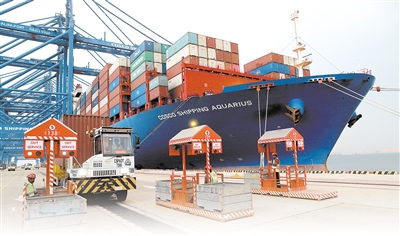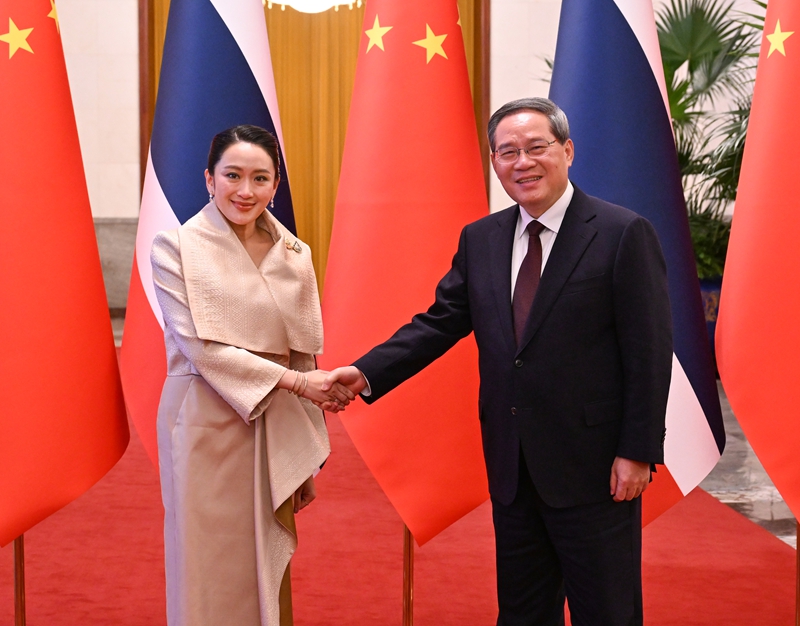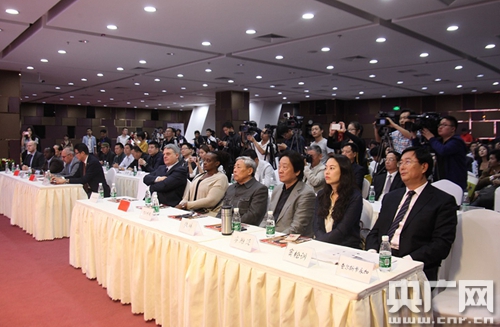Chinese Companies "go Global" And "chain" Strives For The Highest Globally
Chinese Companies "go Global" And "chain" Strives For The Highest Globally
Abstract The latest data from the Ministry of Commerce shows that from January to May this year, China's non-financial direct investment in foreign countries increased by 2.3% year-on-year; investment in countries with joint construction of the "Belt and Road" increased by 20.8%. Member of the Standing Committee of the National Committee of the Chinese People's Political Consultative Conference and Shanghai Public
The latest data from the Ministry of Commerce shows that from January to May this year, China's non-financial direct investment in foreign countries increased by 2.3% year-on-year; investment in countries with joint construction of the "Belt and Road" increased by 20.8%. Zhou Hanmin, member of the Standing Committee of the National Committee of the Chinese People's Political Consultative Conference, President of the Shanghai Public Diplomacy Association, and Senior Advisor of the Silk Road Zhigu Research Institute, accepted an exclusive interview with the International Business Daily, deeply analyzing the national strategic significance of Chinese enterprises' "going global" and the dual challenges faced by them, and systematically put forward a package of policy suggestions such as improving the management service system, encouraging the global layout of professional service institutions, and building a ESG framework with Chinese characteristics.

Since the beginning of this year, Chinese companies have become increasingly firm in their "going out". Data released by the Ministry of Commerce recently showed that from January to May, China's non-financial direct investment in foreign countries was US$61.6 billion, an increase of 2.3% year-on-year. The turnover of foreign contracted projects was US$61.94 billion, a year-on-year increase of 5.4%; the new contract amount was US$98.68 billion, a year-on-year increase of 13%.
In the view of industry insiders interviewed, Chinese companies can better utilize the two domestic and international markets and two resources and integrate themselves into global economic trends. In the future, we should further increase support for enterprises' comprehensive policy of "going out" and support and encourage professional service institutions to carry out global layout to provide market-oriented, professional and international service support for enterprises' "going out".
Foreign investment cooperation is steadily
"Globalization is the general trend, and Chinese enterprises' "going out" has become an important part of the global economy." Zhou Hanmin, member of the Standing Committee of the National Committee of the Chinese People's Political Consultative Conference, president of the Shanghai Public Diplomacy Association, and senior consultant of the Silk Road Zhigu Research Institute, said in an interview with an International Business Daily that the adverse impact of changes in the current external environment has deepened, and "going out" by enterprises is a need of the national development strategy and a need for the company's own development.
Zhou Hanmin pointed out that opening up is a distinctive symbol of Chinese-style modernization. For the world, Chinese companies' "going out" is conducive to promoting connectivity in various fields such as economy and trade, and supporting global economic growth; for countries, companies' "going out" can promote industry development and progress, improve their ability to allocate resources globally, and provide support for China's high-quality economic development; for enterprises, "going out" can better utilize the two domestic and international markets and two resources, and integrate themselves into the global economic trend.
It is worth mentioning that from January to May, China's non-financial direct investment in jointly building the "Belt and Road" countries was US$15.52 billion, an increase of 20.8% year-on-year. Chinese enterprises completed a turnover of US$50.59 billion in national contracting projects jointly built the "Belt and Road" , an increase of 3.9% year-on-year; the new contract amount was US$84.93 billion, an increase of 20.7% year-on-year.
The reporter learned from the China Foreign Contracting Engineering Chamber that recently, good news of Chinese enterprises winning the bid in the "Belt and Road" co-construction national contracting engineering market: China Communications Construction Fourth Aviation Administration won the bid for the construction of multi-functional venues and office buildings in the Phase II of the Draiyemen in Riyadh, Saudi Arabia. This project is a key project for Saudi Arabia's "Vision 2030" to develop the tourism industry. After completion, it will become the core and tourist landmark of the ancient city of Draiye; China Road and Bridge won the bid for the construction of the Pavement of the Rice Ring Line Road in Senegal. After completion, it will effectively improve the transportation conditions in the agricultural production area, improve the efficiency of agricultural product circulation, and help local economic development and rural revitalization; China Communications Information Group won the wireless system contract for the Mongolian crude oil pipeline project, achieving new breakthroughs in the field of overseas energy...
Wei Hao, vice dean of the School of Economics and Business Administration of Beijing Normal University, told the International Business Daily reporter that in the future, we must continue to coordinate the promotion of major landmark projects and "small but beautiful" livelihood projects, promote mutual trust and cooperation between China and its joint construction partners, and promote high-level complementary advantages and mutual benefit and win-win results in the fields of market, capital, technology, etc.
Focus on high value-added fields
Enterprises still face multiple challenges in the process of "going out". This not only requires companies to have a overall grasp of the investment and cooperation process, but also formulate flexible and comprehensive response strategies and strengthen internal compliance management to ensure long-term and stable development.
In Zhou Hanmin's view, Chinese companies "going out" are not smooth sailing, and they face the dual challenges of the international market and their own development. From the perspective of the international market, global protectionism has intensified, the world economy is still full of uncertainty, and it is more difficult for enterprises to explore overseas markets; from the perspective of the enterprise itself, it faces many challenges such as digital transformation and green development, and there are problems such as improvement in innovation capabilities and insufficient international competitiveness, which need to be supported from multiple levels such as policy guarantees, legal guarantees, and technical guarantees.
In this regard, Zhou Hanmin suggested that the support for comprehensive policies should be further strengthened in the future. For example, improve the management and service system of enterprises to "go global", build a comprehensive public service platform, integrate relevant systems and policies including various industry authorities and investment promotion institutions, as well as information resources from embassies and consulates, business associations, etc., to help enterprises better understand the business environment of the host country and prevent overseas investment risks. At the same time, we support and encourage professional service institutions to carry out global layout, expand cross-border service functions, and provide market-oriented, professional and international service support for enterprises to "go global".

In terms of enhancing the competitiveness of enterprises to "go global", Zhou Hanmin suggested that enterprises should be guided to follow the times, uphold the truth and innovate, and develop the ability and ability to fight storms. He gave an example, saying that ESG (environmental, social and corporate governance) is an important indicator system for measuring the sustainable development of enterprises, and international requirements are becoming increasingly strict. In this regard, the government should encourage industry associations to take the lead in formulating ESG disclosure standards for the industry and building an ESG practice framework that has both international recognition and Chinese characteristics.
"The model that relies on low-cost advantages in the past is no longer sustainable. Enterprises should improve their core competitiveness through technological innovation and brand building. Especially in strategic industries such as high-end manufacturing and green energy, enterprises need to "go global" to strengthen their deep integration with the global industrial chain to avoid low-end repeated competition." Zhang Yansheng, chief researcher of the China International Economic Exchange Center, believes that Chinese enterprises need to "go global" to shift from "scale expansion" to "quality improvement" and focus on high-value-added fields. He suggested that small and medium-sized enterprises can form a cluster effect through the "grouping and going overseas" model to jointly form a cluster effect with the upstream and downstream of the industrial chain to reduce the operating risks of individual enterprises.






